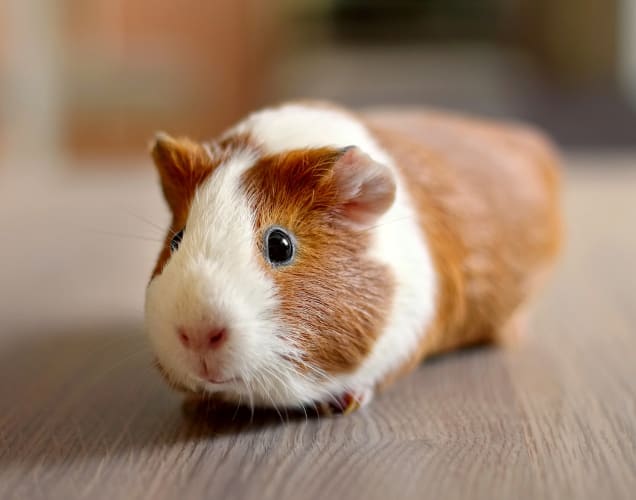Quality Care for Avian & Exotic Pocket Pets in Memphis
We know that caring for your exotic pet requires special knowledge and experience, so rest assured that your loved ones are in good hands.
Our team is dedicated to providing exotic pets and small mammals with proper care so they can have long and healthy lives. We are also here for you whenever your pets are not feeling well.
Our staff of skilled professionals in Memphis are well-trained in the care of exotic and pocket pets and can give you the information you need to keep your pint-sized companion pet looking and feeling great.

FAQs for Care of Exotic Pets
At Southwind Animal Hospital, we provide routine wellness and preventive care services for your exotic pets. we can also see your companion pets for any medical or behavioral concerns they may have.
- What can I expect at my exotic pet's veterinary appointment?
When you bring your exotic companion in for an appointment, the vet will complete a thorough routine exam to assess the general health of your pet.
We'll recommend appropriate preventive care, perform any required tests, and answer any questions you may have about at-home care.
- What housing needs do exotic mammals have?
Exotic mammals have specific care and behavior requirements, and people thinking of purchasing one should check their local laws and regulations in regards to ownership.
For example, ferrets have earned a reputation as escape artists so should be housed in a large cage that's well-ventilated, securely closed and locked. These intelligent, curious and socially interactive animals require a "ferret-proof" play area or room to explore and investigate under supervision.
A hedgehog's large, escape-proof cage should be kept away from direct sunlight, cold areas or drafts. Since hedgehogs have sharp quills, this can make handling difficult and they will require consistent and proper care.
Talk to your vet about your specific pet's housing, nutritional, social and preventive healthcare needs.
- What should I do if my pocket pet is sick?
The most important signs of sickness in pocket pets are loss of appetite, difficulty breathing, diarrhea, and self-isolation from the rest of their colony.
If your gerbil, hamster or rat exhibits those types of symptoms, contact your veterinarian right away and always check with them before you administer any medication to your pocket pet.
Respiratory problems are particularly common in rats and other pocket pets. Remember that your tiny companion's sense of smell is one of their most important links to the world around them. Their olfactory senses tell them if the object in front of them is food, an enemy, or a friend. Any sickness that affects your pocket pet’s ability to breathe is serious and needs to be addressed by your vet.
- What services are available for birds?
Our veterinary team will generally see birds who need their feathers, nails, and beaks trimmed.
If your bird requires other veterinary care contact us to see if we can accommodate their needs or to refer you to a certified avian veterinarian near Memphis.
- What should I do if my bird is sick?
If your bird becomes sick, there are a number of things you can do to help them regain their health, including making sure they are eating and drinking properly.
Separate sick birds from other pets in your house and ensure they stay warm. We also recommend putting birds that have fallen ill on cage rest while they recover to prevent stress, and to give them about 12 hours of light and 12 hours of darkness every day.
Take your bird to your veterinarian for an exam if your avian friend is displaying signs of illness. Seriously ill birds will need to be hospitalized, while those that are only mildly sick or are still eating and drinking may be treated at home by their owners, with a veterinarian's direction.
- What is the avian species?
The avian species involves any and all things in relation to birds. These small exotic animals have become popular pets for people seeking intelligent, affectionate companions with personalities to spare.
Many birds are prey species in the wild and may hide signs of illness as a defense mechanism against predators, making consistent, qualified preventive veterinary care critical to their health and well-being.
- What characteristics do reptiles and amphibians have?
Reptiles and amphibians appeal to many people who would like something different than the traditional furry pet. They require unique environments and preventive care to thrive.
Turtles, snakes, lizards, iguanas, tortoises and more fall under the reptile classification. These air-breathing vertebrates are covered in a specialized skin made of hard scales, bony plates or some combination of the two.
Amphibians include frogs, toads, salamanders and newts, and worm-like caecilians. These cold-blooded vertebrates lack scales. They spend part of their lives in water and part on land.
Your veterinarian can tell you about these animals' special dietary and housing needs.
Exotics We Treat
At Southwind Animal Hospital, we provide dedicated veterinary care for many types of exotic pets, including:
Exotic Mammals
Ferrets, rabbits, pot-bellied pigs, guinea pigs, chinchillas, hamsters, gerbils, sugar gliders, hedgehogs, and others.
Birds
Parrots, finches, canaries, backyard poultry, and others.
Reptiles & Amphibians
Lizards, turtles and tortoises, snakes, and others.
